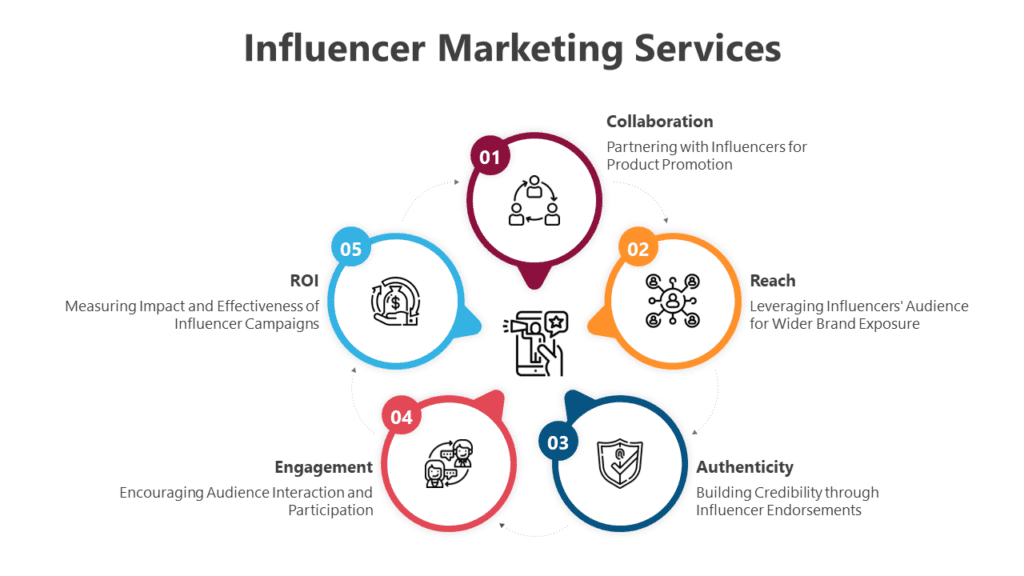
What is Influencer Marketing?
Influencer marketing is a form of social media marketing where businesses collaborate with influencers—individuals who have a large, engaged following on platforms like Instagram, YouTube, TikTok, and Twitter—to promote their products or services. Influencers are trusted by their audience, and their endorsements or product placements can have a significant impact on consumer behavior.
Influencer marketing leverages the influencer’s credibility, personal brand, and relationship with their followers to reach and engage potential customers in an authentic and organic way.
Uses of Influencer Marketing
- Brand Awareness:
- Influencers can help spread the word about a brand to a broader audience, especially when a business is new or looking to expand into a different demographic or market.
- Example: A clothing brand partnering with a popular fashion influencer to showcase their new collection on Instagram.
- Product Promotion & Launches:
- Influencers are often used to promote new products or services, creating buzz and excitement before a launch.
- Example: A tech company releasing a new smartphone may have influencers unbox and review the product for their followers to generate interest.
- Customer Trust & Credibility:
- Consumers tend to trust influencers more than traditional ads, as influencers provide personal, relatable recommendations. When an influencer endorses a product, their followers are more likely to believe it is worth trying.
- Example: A skincare influencer sharing their experience with a particular skincare product builds trust with their audience and encourages them to try it.
- Content Creation:
- Influencers are content creators. By collaborating with them, businesses gain access to high-quality content—images, videos, reviews, and more—that can be used across their marketing channels.
- Example: A travel company working with a travel influencer to create destination videos that can be repurposed for social media or advertising campaigns.
- Targeted Marketing:
- Influencer marketing allows businesses to target specific niches based on the influencer’s follower demographic. This means a company can directly engage with a highly relevant audience.
- Example: A fitness brand working with fitness influencers who cater to a health-conscious audience.
- Increased Engagement:
- Influencers often have loyal and active followers who engage with their content (through likes, comments, shares). Partnering with these influencers can lead to increased interaction and engagement with the brand.
- Example: A food delivery service might partner with food influencers to run interactive contests or giveaways, encouraging engagement.
How Can One Benefit from Influencer Marketing?
For Businesses:
- Expand Reach & Grow Customer Base:
- Influencers can expose your brand to a larger audience. By collaborating with influencers whose followers match your target market, you can gain access to a highly engaged and relevant audience.
- Example: A global brand can reach local markets through micro-influencers who have a strong following in specific regions.
- Boost Sales & Conversions:
- Influencers can directly drive sales through product recommendations. Followers often trust influencers’ opinions, which can lead to more purchases.
- Example: An influencer showing how they use a particular product (like a makeup product) and offering a discount code can lead their followers to buy it.
- Cost-Effective Marketing:
- Compared to traditional forms of advertising (TV, print, etc.), influencer marketing can often be more affordable, especially when working with micro-influencers or nano-influencers. These influencers usually have smaller followings but more engaged audiences, which can yield high returns on investment.
- Example: A small business with a limited marketing budget can collaborate with micro-influencers to gain traction in a specific niche.
- Create Authentic Content:
- Influencers are skilled content creators, and their personal touch often makes their content more engaging and authentic. This authentic content resonates better with their audience, leading to stronger connections with the brand.
- Example: A fitness brand may collaborate with influencers to create workout videos using their products, which appear natural and relatable to their followers.
- Gain Valuable Insights:
- Influencers often provide feedback on what works and what doesn’t when it comes to marketing strategies. They are well-versed in creating content that resonates with their audience, and can offer valuable insight into consumer preferences and trends.
- Example: An influencer may share analytics with a brand showing the most engaging types of posts (e.g., product demonstrations, reviews, or tutorials), allowing the brand to optimize future campaigns.
For Influencers:
- Monetize Your Audience:
- Influencers can earn money by partnering with brands and promoting products or services. Many influencers receive compensation for sponsored posts, affiliate links, and brand collaborations.
- Example: An influencer with a strong following might partner with a clothing brand to promote their latest collection in exchange for a fee or commission.
- Grow Your Personal Brand:
- Collaborating with well-known brands can increase an influencer’s credibility and visibility, further growing their personal brand. Influencers can use these partnerships to solidify their authority in a specific niche.
- Example: A beauty influencer who collaborates with high-end makeup brands gains credibility and increases their influence within the beauty community.
- Creative Opportunities:
- Influencers often have the creative freedom to make content that is engaging, fun, and in line with their personal style. Working with brands can provide opportunities to create diverse and unique content.
- Example: A travel influencer might work with a tourism board to create travel vlogs showcasing unique destinations and experiences, which can be an exciting and creative endeavor.
- Diversify Revenue Streams:
- Influencers can work with multiple brands in different industries, creating various streams of income. Some influencers also use affiliate marketing, where they earn commissions on sales driven by their promotional links.
- Example: A tech influencer might partner with various brands across different product categories—smartphones, gaming equipment, and software—diversifying their income sources.
How to Get Started with Influencer Marketing
- Define Your Goals:
- Identify what you want to achieve with influencer marketing. Is it brand awareness, sales, engagement, or something else? Your goals will help you choose the right influencers and shape the campaign.
- Choose the Right Influencers:
- Consider the influencer’s audience, engagement rate, niche, and values. It’s essential to collaborate with influencers whose followers align with your target demographic and who genuinely resonate with your brand.
- Set a Budget:
- Influencer marketing can range from low-cost collaborations with micro-influencers to expensive campaigns with top-tier influencers. Determine your budget and allocate funds accordingly.
- Develop a Campaign Strategy:
- Decide on the type of content you want influencers to create (e.g., Instagram posts, YouTube videos, TikTok challenges). Make sure the content aligns with your brand’s message and voice.
- Measure Results:
- Track the success of your influencer campaigns using metrics such as engagement rates, website traffic, sales, or other KPIs (Key Performance Indicators). This helps you evaluate the effectiveness of your influencer partnerships.
Conclusion
Influencer marketing is a powerful strategy for brands and influencers alike, offering opportunities to build trust, increase brand awareness, drive sales, and create authentic content. By collaborating with the right influencers, businesses can tap into a loyal, engaged audience and benefit from the credibility that influencers bring to the table. Whether you’re a business looking to grow your reach or an influencer aiming to monetize your following, influencer marketing offers a mutually beneficial way to connect with your target audience.
